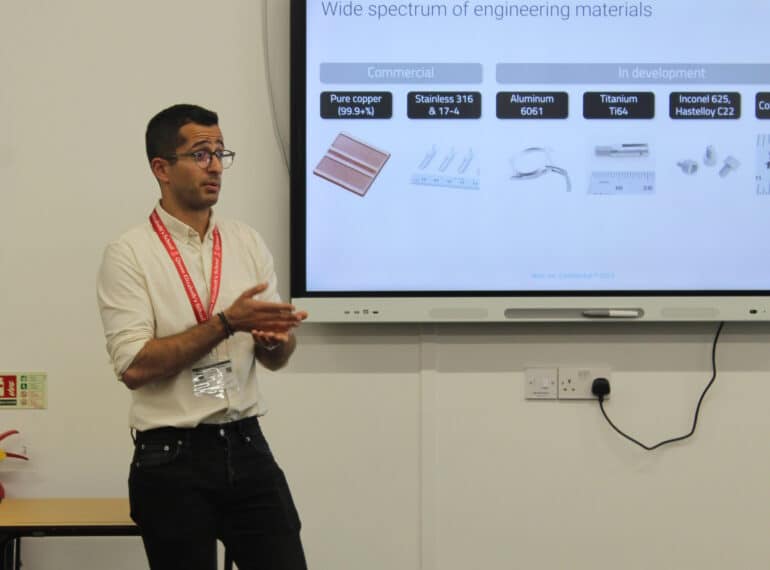
3D printing entrepreneur Arian Aghababaie, co-founder of California-based Holo, shared insights into the latest developments in additive manufacturing and gave advice on engineering careers when he led two inspirational events at QE during a visit to the UK.
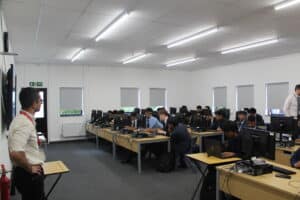 After working for global software firm Autodesk, based in San Francisco, Arian (OE 1998–2003) raised venture capital and successfully spun out its additive manufacturing team to form Holo, while also transitioning its technology from the 3D printing of polymers to metals. Six-and-a-half years later, Holo is at the forefront of innovation, using its proprietary digital platform to enable the manufacturing at scale of high-performance parts across a range of materials, including metals, ceramics and composites. Holo is supported by top-tier Silicon Valley investors and strategic partners.
After working for global software firm Autodesk, based in San Francisco, Arian (OE 1998–2003) raised venture capital and successfully spun out its additive manufacturing team to form Holo, while also transitioning its technology from the 3D printing of polymers to metals. Six-and-a-half years later, Holo is at the forefront of innovation, using its proprietary digital platform to enable the manufacturing at scale of high-performance parts across a range of materials, including metals, ceramics and composites. Holo is supported by top-tier Silicon Valley investors and strategic partners.
Arian’s morning at QE began with a tour of the School, before he led a Sixth Form additive manufacturing workshop, with five of QE’s own 3D printers on hand. Later, he delivered a lunchtime talk, giving his take on careers in engineering and 3D printing.
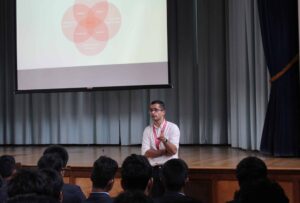 Head of Technology Michael Noonan said: “Arian provided Year 12 with a workshop which firstly covered his professional journey to date, from his early days post PhD working on founding his own company (The Invention Works) through to his position as Senior Principal Engineer at Autodesk. Most of the workshop, however, focussed on his current company, Holo. He explained that he and the other co-founders could see the enormous potential to create a viable business in this area and so pursued it as an opportunity.”
Head of Technology Michael Noonan said: “Arian provided Year 12 with a workshop which firstly covered his professional journey to date, from his early days post PhD working on founding his own company (The Invention Works) through to his position as Senior Principal Engineer at Autodesk. Most of the workshop, however, focussed on his current company, Holo. He explained that he and the other co-founders could see the enormous potential to create a viable business in this area and so pursued it as an opportunity.”
Arian went on to explain the details around the scale of production, the materials used and the fidelity of the products which Holo’s machines can make through its own PureForm Technology.
“His technologies have a unique advantage over competitors, and he works with many major companies in the healthcare, consumer electronics, robotics, and automotive sectors, to name a few,” said Mr Noonan.
He even set the Year 12 boys a challenge to develop a product using QE’s own 3D printers. They should design (and perhaps build) a scaled-up, minimally invasive surgical instrument. His requirements were that:
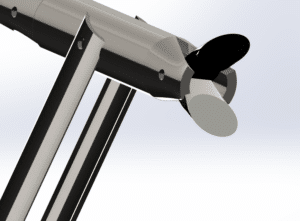 The instrument should have six degrees of freedom
The instrument should have six degrees of freedom- It should be able to be cable or gear-driven
- The boys’ work should include the design of at least two custom end-effectors (the devices at the end of a robotic arm, designed to interact with the environment)
- They should determine its size and features based on the capabilities of their own printers.
Bonus points were offered for the designs with the fewest components and if the end-effectors could be easily changed within the same clevis pin (part of a fastener system)!
Two examples of the boys’ work in response to the challenge are shown here.
 In the lunchtime talk to Year 10, Arian took a more personal look at his story, beginning with his time at QE, when he was in Stapylton House and was a musician and prefect.
In the lunchtime talk to Year 10, Arian took a more personal look at his story, beginning with his time at QE, when he was in Stapylton House and was a musician and prefect.
After first presenting a version of his life which had him gliding seamlessly from his first engineering degree at Bristol to gaining his doctorate, also at Bristol, moving to San Francisco in 2016 and then founding Holo the following year, he next spoke about “what it’s actually been like” – a narrative that includes leaving QE early, dropping out of university, the financial crash and the huge impact of Covid.
The lessons he learned included “stay true to your authentic self” and “don’t fear failure”.
The visit came about after Headmaster Neil Enright struck up a conversation with Arian on LinkedIn.
Mr Noonan said: “It really was a tremendous day. One of the boys involved said to me afterwards: ‘Sir, are you aware that Arian is working in the job we all dream to have one day?’ I am immensely grateful to Arian for taking the time to give back to his School and for giving our students something amazing to aspire to.”


 His QE contemporaries, Sam Bayney and Harikesan Baskaran, were also among those helping out on the day.
His QE contemporaries, Sam Bayney and Harikesan Baskaran, were also among those helping out on the day. Galactic Challenge, which is for students aged 10-14, is the sister competition of the UK Space Design Competition (UKSDC), which is for those aged 15–18. Aadil has for several years supported both competitions and is a member of the UKSDC board. A Senior Analyst with the Cabinet Office, he graduated with a first in Physics from Imperial College London.
Galactic Challenge, which is for students aged 10-14, is the sister competition of the UK Space Design Competition (UKSDC), which is for those aged 15–18. Aadil has for several years supported both competitions and is a member of the UKSDC board. A Senior Analyst with the Cabinet Office, he graduated with a first in Physics from Imperial College London. In addition to Aadil, the competition was judged by staff from the Space Science & Engineering Foundation, as well as QE Head of Physics Jonathan Brooke, and Dr Flore Faille, Head of Physics at HBS.
In addition to Aadil, the competition was judged by staff from the Space Science & Engineering Foundation, as well as QE Head of Physics Jonathan Brooke, and Dr Flore Faille, Head of Physics at HBS.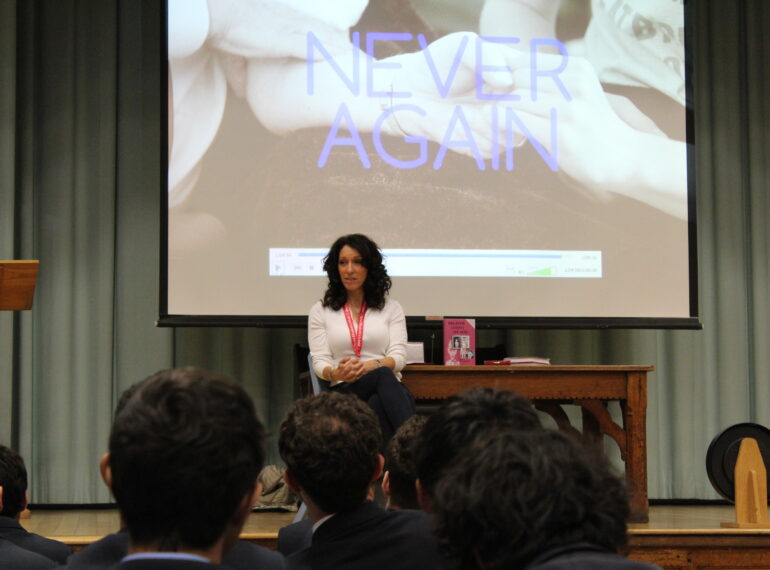
 The film, Breathe Deeply My Son, was shown to Year 9, with a question-and-answer session afterwards.
The film, Breathe Deeply My Son, was shown to Year 9, with a question-and-answer session afterwards.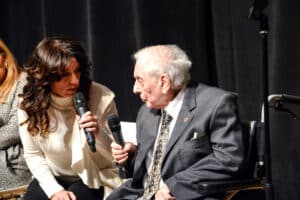 Mr Wermuth survived the war weighing just 5st 3lb (33kg). His father, mother and sister all died in concentration camps.
Mr Wermuth survived the war weighing just 5st 3lb (33kg). His father, mother and sister all died in concentration camps.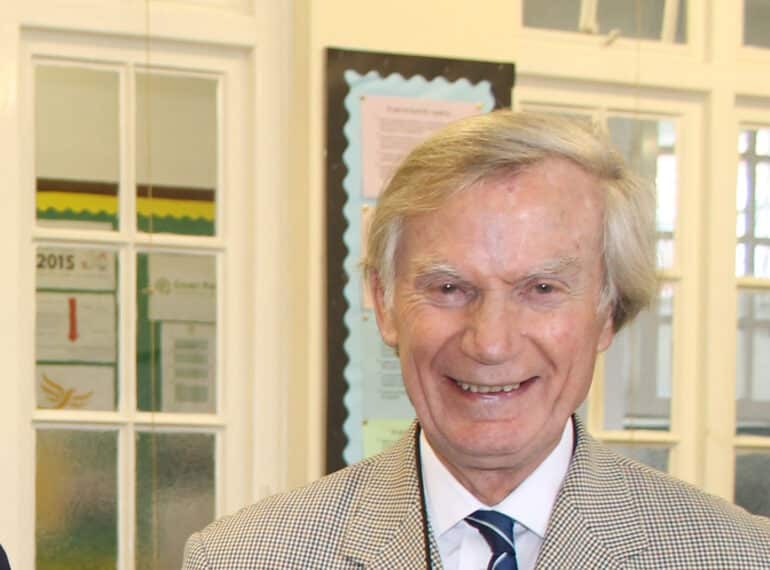
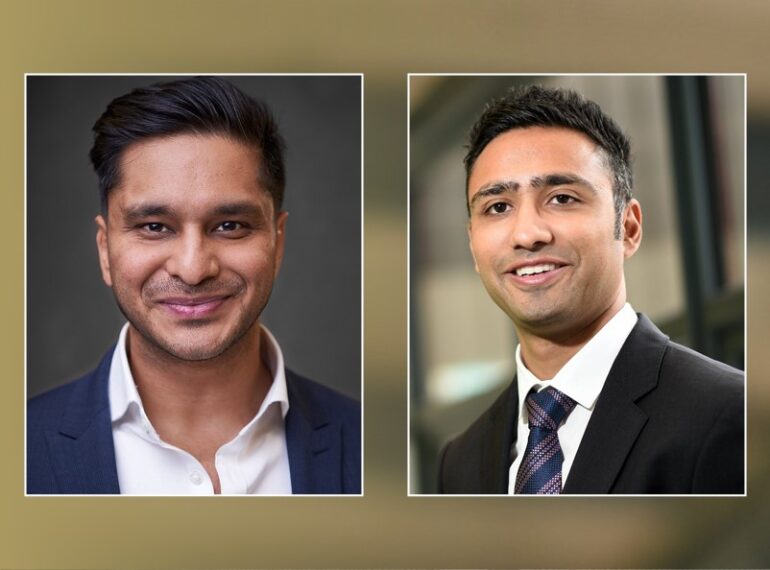
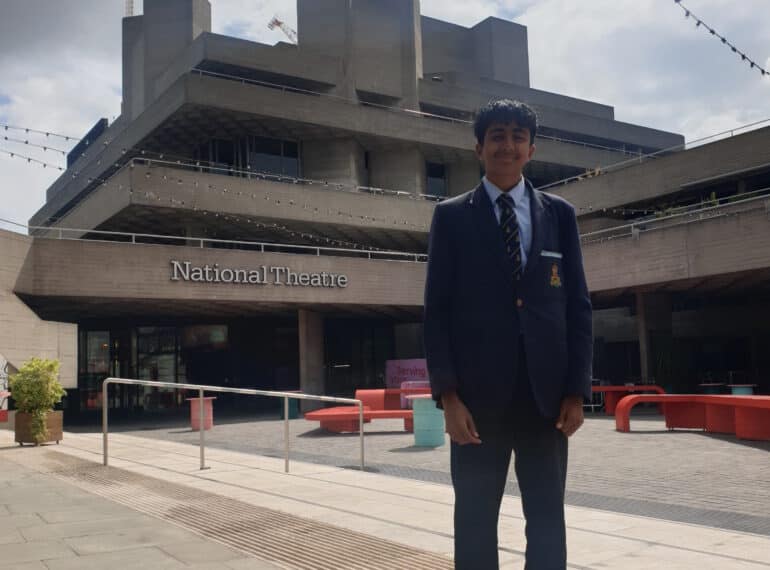
 Head of English Robert Hyland said: “Many congratulations to Adithya for a wonderful achievement. For someone as young as him to produce such a powerful piece of writing is truly astonishing – and for a student to have their work performed at the National Theatre is unprecedented in the School’s history.
Head of English Robert Hyland said: “Many congratulations to Adithya for a wonderful achievement. For someone as young as him to produce such a powerful piece of writing is truly astonishing – and for a student to have their work performed at the National Theatre is unprecedented in the School’s history.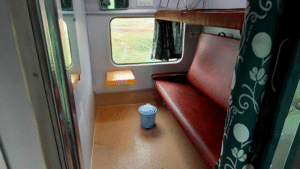 His play was a philosophical and reflective story about a British-Indian teenager taking a train ride across southern India after his mother’s death, and the relationship he developed both with his father and with the country of India.
His play was a philosophical and reflective story about a British-Indian teenager taking a train ride across southern India after his mother’s death, and the relationship he developed both with his father and with the country of India.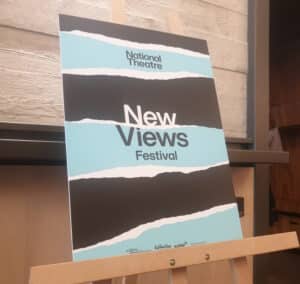 Adithya’s mentor, Andrew Muir, has had plays produced throughout the UK and in recent years his work has been performed at the National Theatre’s Connections festival, at Soho Theatre and on the BBC. His assessment of Adithya’s play described it as “a joyous road trip of a story, in which both father and son are brought back together again following the devastating loss of their wife and mother respectively.
Adithya’s mentor, Andrew Muir, has had plays produced throughout the UK and in recent years his work has been performed at the National Theatre’s Connections festival, at Soho Theatre and on the BBC. His assessment of Adithya’s play described it as “a joyous road trip of a story, in which both father and son are brought back together again following the devastating loss of their wife and mother respectively.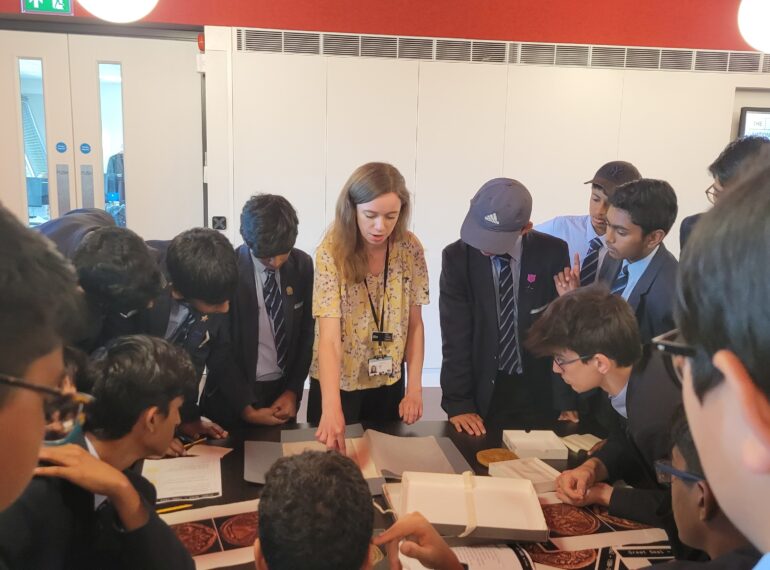
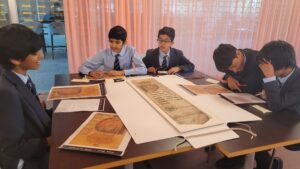 Among the artefacts viewed by the group during their visit to Kew was the actual letter – known as the ‘Tide Letter’ – written by the future Queen Elizabeth I, founder of Queen Elizabeth’s School, as she battled for survival following her arrest in 1554.
Among the artefacts viewed by the group during their visit to Kew was the actual letter – known as the ‘Tide Letter’ – written by the future Queen Elizabeth I, founder of Queen Elizabeth’s School, as she battled for survival following her arrest in 1554.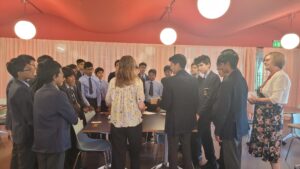 The visit was a reward for the boys who submitted the best entries to Project 1573. This involved small groups of boys being given three primary sources relating to a particular aspect of QE’s history and then asked to produce a three-minute presentation after accessing
The visit was a reward for the boys who submitted the best entries to Project 1573. This involved small groups of boys being given three primary sources relating to a particular aspect of QE’s history and then asked to produce a three-minute presentation after accessing 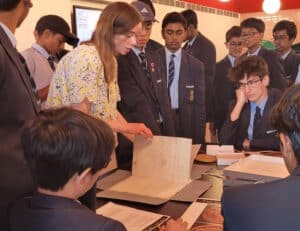 Kelvin Chen, Ethan Yao, Jonas Dawit and Rishi Sen, also of Year 8 Pearce, researching E W Harrison, a long-serving teacher who retired in 1950 and is one of the two unrelated people after whom the Harrisons’ House is named
Kelvin Chen, Ethan Yao, Jonas Dawit and Rishi Sen, also of Year 8 Pearce, researching E W Harrison, a long-serving teacher who retired in 1950 and is one of the two unrelated people after whom the Harrisons’ House is named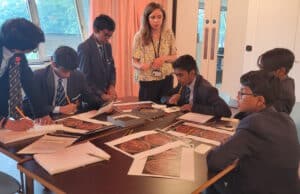 “The students were able to see the neat handwriting at the start of the letter become larger and messier as she was likely made to hurry by those waiting to escort her to the Tower. Fearing her enemies might alter the letter, Elizabeth struck lines through the blank space above her signature,” said Mrs Blackford.
“The students were able to see the neat handwriting at the start of the letter become larger and messier as she was likely made to hurry by those waiting to escort her to the Tower. Fearing her enemies might alter the letter, Elizabeth struck lines through the blank space above her signature,” said Mrs Blackford.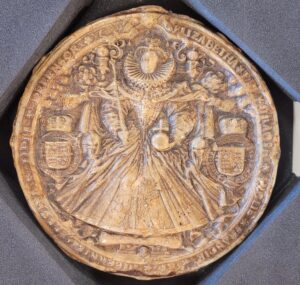 QE’s founding Royal Charter of 1573 was authorised with Queen Elizabeth’s first seal. This, however, wore out during her long reign, and, Ms Blackford said, the boys enjoyed finding out about its replacement: “It is noticeably more elaborate, as Elizabeth had started to closely monitor her image.”
QE’s founding Royal Charter of 1573 was authorised with Queen Elizabeth’s first seal. This, however, wore out during her long reign, and, Ms Blackford said, the boys enjoyed finding out about its replacement: “It is noticeably more elaborate, as Elizabeth had started to closely monitor her image.”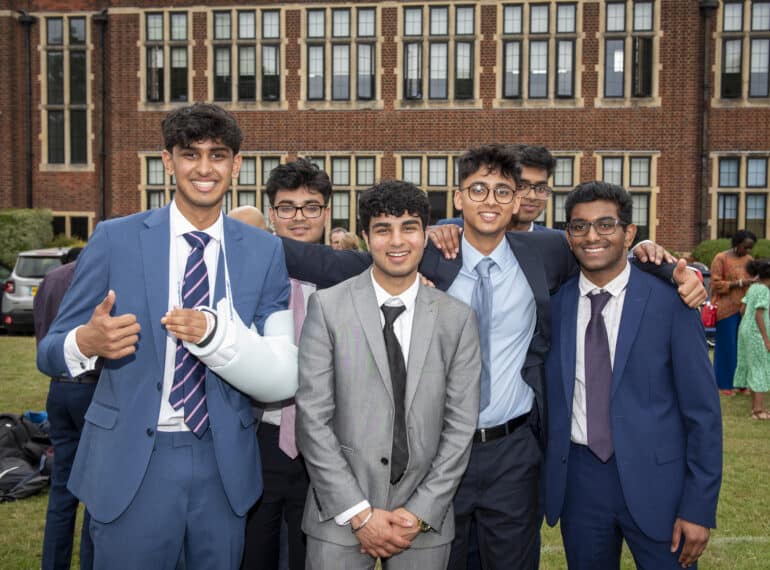
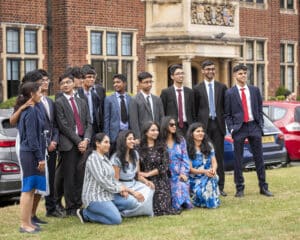 There were prizes for some, while the contribution of all the leavers – or graduands – was celebrated during an occasion in Shearly Hall that featured speeches and presentations, followed by afternoon tea on Staplyton Field.
There were prizes for some, while the contribution of all the leavers – or graduands – was celebrated during an occasion in Shearly Hall that featured speeches and presentations, followed by afternoon tea on Staplyton Field.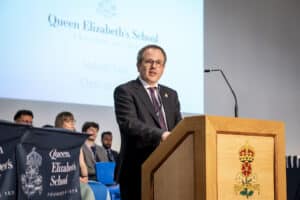 Headmaster Neil Enright thanked parents for their “huge support, both moral and financial, over the years” and urged both them and their sons to stay in touch with the School.
Headmaster Neil Enright thanked parents for their “huge support, both moral and financial, over the years” and urged both them and their sons to stay in touch with the School.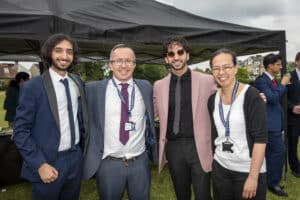 Sahil attended Valediction together with his mother, cousin, friends and his brother, Nikhil Handa (OE 2013–2020). He recalled his first encounter with Deputy Head (Pastoral) David Ryan, who hauled him over the coals after spotting him dancing outside the classroom window to entertain his classmates during afternoon form time. This less-than-auspicious beginning soon turned into a supportive relationship, however, when he became part of Mr Ryan’s English class. “I thought he’d make my life miserable. But to my surprise, it seemed as though he’d forgotten the whole episode entirely. I went on to learn everything from him… Mr Ryan was also the first person who complimented me for being a generalist.”
Sahil attended Valediction together with his mother, cousin, friends and his brother, Nikhil Handa (OE 2013–2020). He recalled his first encounter with Deputy Head (Pastoral) David Ryan, who hauled him over the coals after spotting him dancing outside the classroom window to entertain his classmates during afternoon form time. This less-than-auspicious beginning soon turned into a supportive relationship, however, when he became part of Mr Ryan’s English class. “I thought he’d make my life miserable. But to my surprise, it seemed as though he’d forgotten the whole episode entirely. I went on to learn everything from him… Mr Ryan was also the first person who complimented me for being a generalist.”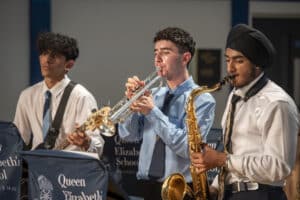 A large majority of Year 13 students attended. All received a set of QE cufflinks, while the prizewinners also received a copy of former Headmaster Dr John Marincowitz’s new history of the School, Queen Elizabeth’s School: 1573–2023. Among the speakers was Theo Mama-Kahn, School Captain 2022, who was one of the leavers. He gave a vote of thanks.
A large majority of Year 13 students attended. All received a set of QE cufflinks, while the prizewinners also received a copy of former Headmaster Dr John Marincowitz’s new history of the School, Queen Elizabeth’s School: 1573–2023. Among the speakers was Theo Mama-Kahn, School Captain 2022, who was one of the leavers. He gave a vote of thanks.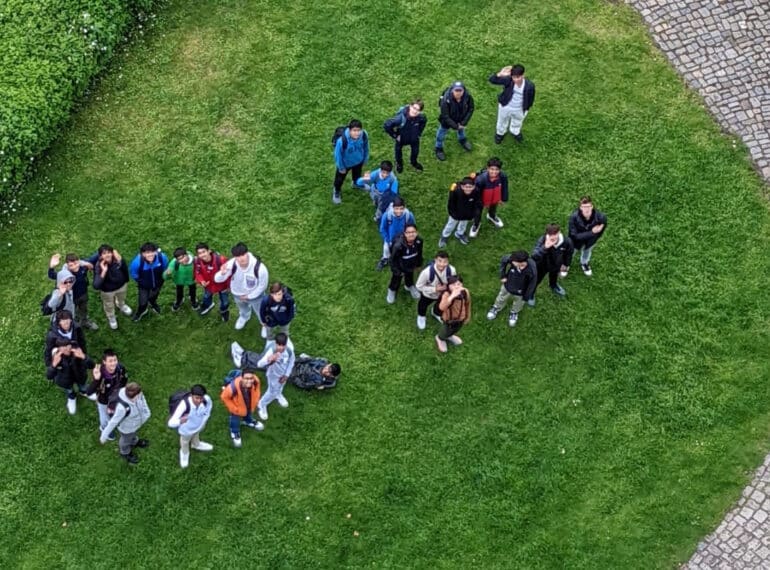
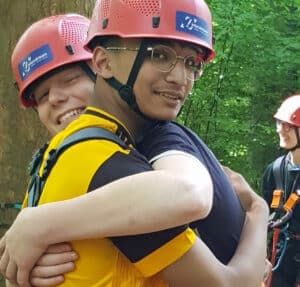 The Year 9 trip to the north German city of Bielefeld saw the QE party enjoy the high life at one of the world’s tallest and fastest roller-coasters, at a tree-climbing adventure park and at the mediaeval Sparrenberg Castle (known locally as the Sparrenburg), which towers over the city centre.
The Year 9 trip to the north German city of Bielefeld saw the QE party enjoy the high life at one of the world’s tallest and fastest roller-coasters, at a tree-climbing adventure park and at the mediaeval Sparrenberg Castle (known locally as the Sparrenburg), which towers over the city centre.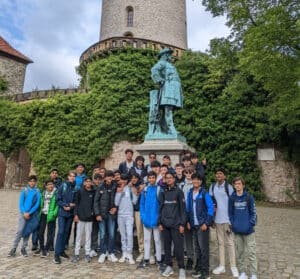 The exchange, which began in 2005, is with a co-educational grammar school (or ‘Gymnasium’), Friedrich von Bodelschwingh Gymnasium in Bielefeld. The school is named after a German pastor, theologian and public health advocate, who ran large homes for people with learning difficulties and refused to comply with the Nazis’ euthanasia policies.
The exchange, which began in 2005, is with a co-educational grammar school (or ‘Gymnasium’), Friedrich von Bodelschwingh Gymnasium in Bielefeld. The school is named after a German pastor, theologian and public health advocate, who ran large homes for people with learning difficulties and refused to comply with the Nazis’ euthanasia policies.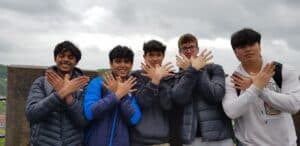 Music: the boys created their own digital music using GarageBand software. One of the party, Peter Atanasov, said: “We made our own beats on iPads to accompany a melody and learnt about new music genres as well.”
Music: the boys created their own digital music using GarageBand software. One of the party, Peter Atanasov, said: “We made our own beats on iPads to accompany a melody and learnt about new music genres as well.”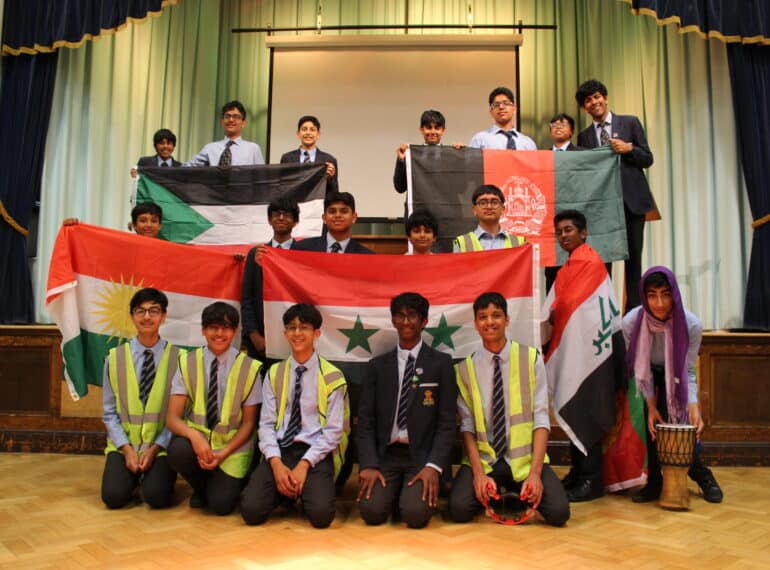
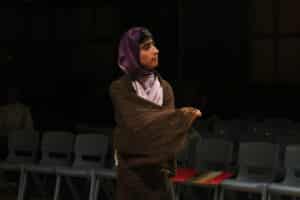 Performed during national Refugee Week, the play, which is itself called The Jungle, gave a voice to some of the thousands of men, women and children from many different countries who lived in the camp while trying to gain access to the UK.
Performed during national Refugee Week, the play, which is itself called The Jungle, gave a voice to some of the thousands of men, women and children from many different countries who lived in the camp while trying to gain access to the UK.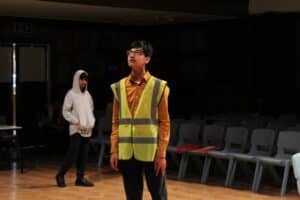 An award-winning play, The Jungle was written by two young playwrights, Joe Murphy and Joe Robinson, who met while studying English at Oxford. In the autumn of 2015, they first came to the Jungle camp, returning a short time later after crowdfunding to bring an 11m white geodesic dome there to serve as a theatre and community & arts space. They then spent seven months volunteering in the Jungle, before the authorities took down the encampment in 2016.
An award-winning play, The Jungle was written by two young playwrights, Joe Murphy and Joe Robinson, who met while studying English at Oxford. In the autumn of 2015, they first came to the Jungle camp, returning a short time later after crowdfunding to bring an 11m white geodesic dome there to serve as a theatre and community & arts space. They then spent seven months volunteering in the Jungle, before the authorities took down the encampment in 2016. Aahan said: “Playing the role of someone who has been far less privileged than myself and has had many different experiences has been really interesting. Additionally, the character I played weaves himself in and out of the story, as if controlling it and the perspective, which was something really challenging but also really fun!”
Aahan said: “Playing the role of someone who has been far less privileged than myself and has had many different experiences has been really interesting. Additionally, the character I played weaves himself in and out of the story, as if controlling it and the perspective, which was something really challenging but also really fun!”